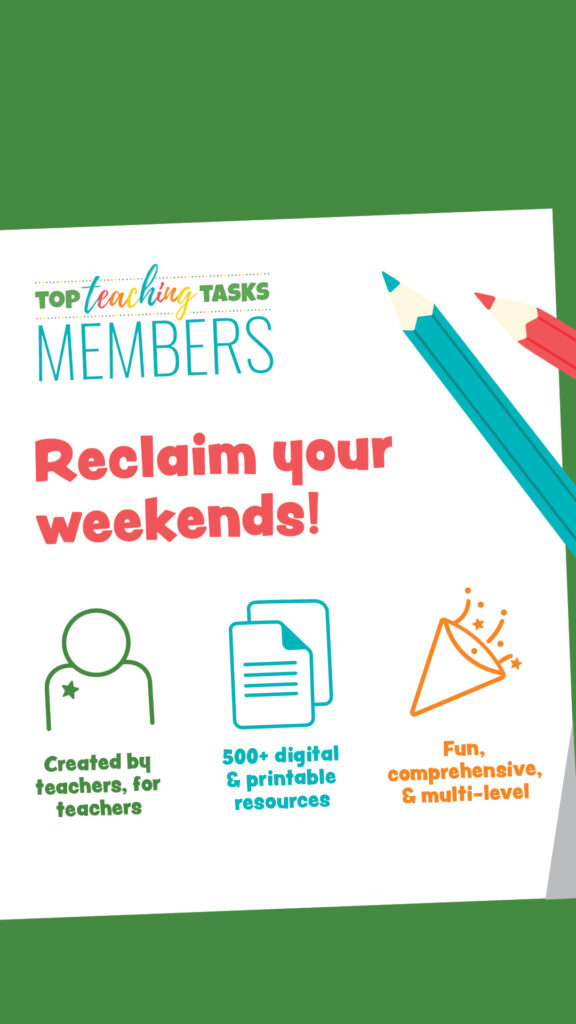Overcoming Teacher Imposter Syndrome
Overcoming Teacher Imposter Syndrome
I have been weighing up whether to write this post for a while now because it is a lot more personal than usual. But here I am, sitting down at the keyboard and its time to get started.
From the day I stepped into my first classroom, I struggled with imposter syndrome. For me it is a feeling of being an imposter or a fraud as a teacher, and that the whole world is going to find out very soon!
Thankfully I no longer feel this way (most of the time). After some soul searching, research and good chats with my teacher BFFs, I learned what worked for me. Here is my story.
My Story of Overcoming Teacher Imposter Syndrome
As a beginning teacher, I came into the classroom with a range of previous experience working with children. My classroom looked bright and attractive, and my students were, for the most part, well behaved. My mentor teacher saw these outward positives of my burgeoning teaching career and noticeably backed off a bit with her support. That isn’t a criticism of my mentor teacher; it is hard to help someone if you don’t know that they need it.
The problem for me was… I DID need help! I was a new teacher, I was learning the ropes of teaching, and I certainly did not have it all together. What began to develop in me was a sense of being a fraud, and of hoping that I wouldn’t be caught out – this is the basic essence of Imposter Syndrome. I remember thinking, “Everyone thinks I am doing so well. Wait until they find out how clueless I really am!” and then thinking, “They can NEVER find out!”
I would get praise in some areas: “Your classroom looks great,” “Isn’t little Jimmy behaving well,” “What a great assembly you ran.” Every compliment that came my way just reinforced to me that people were seeing a version of me as a teacher that didn’t feel real. “Yes, thank you, my assembly went well and I am glad little Jimmy is behaving, BUT, how the heck do you teach MATHS!??!?! How am I meant to fit all the different writing genres into one year?”
Why didn’t I just ask for help?

It seems like such an obvious question to me now – why didn’t I ask for help? But really, who can admit to actually enjoying asking for help? Looking back, I think there are three main reasons I didn’t seek out assistance:
- I was not on a permanent contract, so I was essentially trying to gain a future permanent position within the school. I’ve learned since that employers look at a full picture and actually respect those who ask for help. At the time, however, I felt like asking too many questions would limit my chances of being re-employed.
- My sense of identity came from the positive encouragement I received. I felt like if I admitted to my insecurities and lack of knowledge, I would be found out.
- To ask for help is to admit you need it, and that takes a level of humility and security in one’s self that I didn’t have at that point.
So, the spiral continued, and so too did the pressure I lumped on myself. By the end of my first year, I was a walking-talking-people-pleasing-Faker-Mc-Fake-A-Lot, and I only had myself to blame.
I knew that I couldn’t continue this way. I felt like a performing monkey – constantly seeking external approval, and then not accepting that approval when I got it. What I needed was to shake the doubts about my abilities and cut myself some slack. Otherwise, this imposter syndrome was going to rob me of my teaching joy and I would end up running out of the building and never coming back.
How I overcame Teacher Imposter Syndrome

1. I challenged my perfectionism
I have always been a bit of a perfectionist and that definitely didn’t help with my imposter syndrome. As fate would have it, nearer the end of my first year teaching, my principal directed each teacher at the school to spend one day observing in other teachers’ classrooms. This was a pivotal moment for me because my reality began to challenge my internal beliefs. My internal belief was that I was a terrible Maths teacher (perfectionism alert, perfectionism alert) and that my students reading levels were improving, not through any good teaching on my part, but through osmosis. During those observations, I watched six experienced teachers go about their teaching business – Maths, Writing, Reading, PE and all the rest – and I began to notice something: our planning, routines and teaching styles were pretty similar, and in some areas, I had definite strengths. I also saw that their lessons were great, but that they weren’t perfect. Aiming to be a perfect teacher was an unattainable and pointless goal.
Do you struggle with perfectionism? What internal self-talk do you need to challenge?
2. I asked for help
My confidence in teaching maths didn’t magically improve, but I realised I was able to learn from Maths experts. I became proactive: I began to ask, read, and research. Instead of looking at myself as if I was a needy freakazoid, I gained respect from being open with my teaching peers. It actually opened up conversations where they could also say, “Hey, I feel like my Spelling program could be improved. What is yours like?” Even now, Maths is not my teaching speciality, but I buy many great Math resources to supplement my knowledge and improve my teaching practice. Then, I return the favour by creating literacy and social studies products to help people who may have gaps in that area.
Who is a “safe” person you could be 100% honest with about how you are feeling? You won’t regret opening up to others.
3. I Learned to Celebrate the small wins
Lastly, I learned to celebrate my achievements – the small wins, the successful lessons, the fun times in the classroom. “Tall Poppy Syndrome”, cutting someone down who we perceive is getting a bit full of themselves, is alive and well in New Zealand, and most likely all over the world. Because of this, we can worry that people will think we are bragging or arrogant if we celebrate a win or let people know we are proud of something that happened in our classroom. Also, people with imposter syndrome will explain away any success as luck, chance, or a result of something outside of their actions. I did that frequently, and still catch myself doing it now. This just needs to stop. If you don’t celebrate your wins, have a think what you will end up focusing on… And look, some days the win might be that the kid with massive behaviour issues was good for ten minutes more than usual, or that there was no line for the microwave at lunchtime. A win is a win is a win!
What small or large wins can you celebrate today?
Final thoughts
So there you have it. That is my journey to overcoming teacher imposter syndrome which, by the way, I am still on (don’t ask me how many drafts of this blog post I did before I pushed Publish). I don’t know if imposter syndrome ever really goes away, but I have the tools to smash it in the face if it tries to ruin me.
Take a risk. Ask for help. Celebrate the wins, even the smallest of the small. This job is hard enough without doubting whether you should even be here.
Join our membership
Onwards and upwards,









